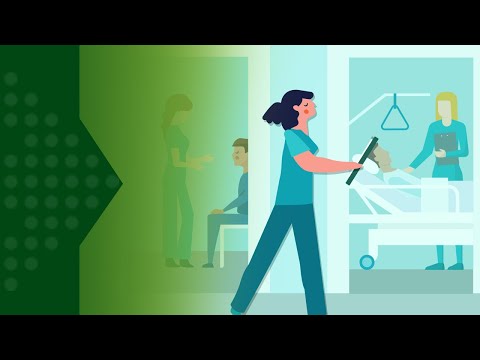Nurse or Medical Assistant: Which is the Better Career Choice?
Contents
- Why choose a career in nursing or medical assisting?
- What are the key differences between nursing and medical assisting?
- What are the similarities between nursing and medical assisting?
- What are the education and training requirements for nursing and medical assisting?
- What are the job outlook and salary expectations for nursing and medical assisting?
- What are the advantages of a career in nursing?
- What are the advantages of a career in medical assisting?
- What are the disadvantages of a career in nursing?
- What are the disadvantages of a career in medical assisting?
- Which career is right for you – nursing or medical assisting?
When it comes to choosing a career in the medical field, there are many factors to consider. If you’re trying to decide between becoming a nurse or a medical assistant two of the most important factors to consider are job outlook and salary.
Checkout this video:
Why choose a career in nursing or medical assisting?
If you’re trying to decide between a career in nursing or medical assisting, it’s important to understand the similarities and differences between the two professions. Both careers involve working closely with patients and providing them with medical care and support. However, there are some key differences that you should take into account before making your decision.
Medical assistants generally have more limited responsibilities than nurses. They may provide basic patient care, take medical histories and perform administrative tasks, but they do not usually provide direct patient care or make diagnoses. Nurses, on the other hand, have a much wider scope of practice. In addition to providing direct patient care, they also assess patients’ needs, develop treatment plans and educate patients about their conditions.
Nurses must have at least an associate’s degree in nursing, although many jobs now require a bachelor’s degree. Medical assistants can receive on-the-job training or complete a formal education program, but most jobs require at least a certificate or diploma.
Salaries for nurses and medical assistants vary depending on experience and location, but nurses generally earn higher salaries than medical assistants. According to the U.S. Bureau of Labor Statistics, the median annual salary for registered nurses was $68,450 in 2015, while the median annual salary for medical assistants was $30,590.
Both nursing and medical assisting are rewarding careers that offer opportunities for growth and advancement. However, if you are looking for a career with more responsibility and higher earnings potential, nursing may be the better choice for you.
What are the key differences between nursing and medical assisting?
Nurses and medical assistants are both important members of the healthcare team. They both provide care and support to patients, but there are some key differences between the two roles. Nurses are licensed professionals who have completed an accredited nursing program. Medical assistants, on the other hand, do not need to be licensed. They typically have a certificate or diploma from a medical assisting program.
Nurses provide direct patient care, whereas medical assistants typically provide indirect patient care. Nurses also have more responsibility for patient care than medical assistants. They develop and implement nursing care plans, administer medications, and monitor patients’ progress. Medical assistants, on the other hand, may perform some limited patient care tasks such as taking medical histories and measuring vital signs. In some states, they may also be allowed to administer medications under the supervision of a licensed nurse or physician.
Nurses typically work in hospitals, but they may also work in clinics, doctor’s offices, or home healthcare settings. Medical assistants typically work in clinics or doctor’s offices.
If you are interested in a career in healthcare, both nursing and medical assisting can be good choices. However, you should carefully consider your goals and interests before making a decision.
What are the similarities between nursing and medical assisting?
There are many similarities between nursing and medical assisting. Both are health care professions that provide vital services to patients. Both require a high degree of knowledge, skill, and compassion. And both offer excellent career opportunities for those who are interested in helping others.
So, which is the better career choice? That depends on your individual goals and preferences. If you want a more hands-on role in patient care, then nursing may be the better option. If you prefer a more administrative role, then medical assisting may be a better fit.
Both nursing and medical assisting are rewarding careers that offer good job satisfaction, job security, and good pay. So, ultimately, the best career choice is the one that is right for you.
What are the education and training requirements for nursing and medical assisting?
The education and training requirements for nursing and medical assisting are quite different. Nurses must complete an accredited nursing program and pass the national licensing exam, known as the NCLEX-RN. Medical assistants, on the other hand, can get started with on-the-job training or by completing a postsecondary certificate or diploma program. While both professions require passing an exams, medical assistants are not licensed.
Nurses must complete an accredited nursing program and pass the national licensing exam, known as the NCLEX-RN. Licensed practical nurses (LPNs) and registered nurses (RNs) both have job options open to them in a variety of settings, such as hospitals, clinics, physicians’ offices, and home health agencies The main difference between the two is that RNs have more education and can therefore perform more complex tasks than LPNs. For example, RNs can give medication and start intravenous fluids, whereas LPNs cannot.
Medical assistants typically have more duties than certified nurse aides (CNAs), but their responsibilities are less complex than those of licensed professionals. Medical assistants usually work in doctors’ offices or clinics, performing routine clinical tasks such as taking medical histories and recording vital signs. They may also administer injections, apply dressings to wounds, prepare patients for X-rays or laboratory tests, schedule appointments, arrange for hospital admissions and laboratory services, and collect specimens for laboratory analysis.
What are the job outlook and salary expectations for nursing and medical assisting?
Both nursing and medical assisting are expected to experience above-average job growth in the coming years. According to the Bureau of Labor Statistics, employment of nurses is projected to grow by 15 percent from 2016 to 2026, and employment of medical assistants is projected to grow by 29 percent over the same period.
Salaries for both nursing and medical assisting are quite similar. The median annual salary for registered nurses was $70,000 in 2016, while the median annual salary for medical assistants was $30,590. One major difference between the two careers is that nurses are generally required to have a four-year degree, while medical assistants can typically get by with a one- or two-year certificate or diploma.
What are the advantages of a career in nursing?
Nursing is a stable and Rewarding Career
A career in nursing offers many advantages. Nurses are in high demand and the job outlook for nurses is very bright. The median pay for registered nurses was $71,000 in 2017, and the number of jobs is expected to grow by 15% between 2016 and 2026, according to the U.S. Bureau of Labor Statistics.
In addition to the financial rewards, nursing is a stable and rewarding profession that offers nurses the opportunity to make a difference in the lives of their patients. Nurses work in a wide variety of settings, including hospitals, clinics, doctor’s offices, schools, Home Health Care agencies, and nursing homes They may also work for government agencies or private companies.
What are the advantages of a career in medical assisting?
Medical assisting is a popular choice for those seeking a career in the medical field. There are several advantages to this career choice. One of the biggest advantages is the earning potential. Medical assistants can earn a good salary, especially when compared to other entry-level healthcare positions.
Another advantage of medical assisting is job security. The demand for medical assistants is expected to grow much faster than other occupations over the next decade, so employment opportunities should be plentiful. This is especially good news for those who are looking for a career that will offer long-term stability.
Finally, medical assistants usually have relatively flexible schedules. Many positions offer evenings or weekends off, and some medical assistants are even able to work from home. This can be a great perk for those who have families or other obligations that make scheduling difficult.
What are the disadvantages of a career in nursing?
For many people, a career in nursing is an excellent choice. However, there are some disadvantages to consider before making the decision to become a nurse. One of the biggest disadvantages is the potential for long hours and irregular shifts. Nurses often work 12-hour shifts, and their workdays can be unpredictable. They may be required to work nights, weekends, and holidays. Another disadvantage of a career in nursing is the exposure to sick patients and hazardous materials. Nurses are at risk of being exposed to infectious diseases and dangerous chemicals on a daily basis. They also deal with a lot of stress and emotional trauma.
What are the disadvantages of a career in medical assisting?
A career in medical assisting can be a great choice for those interested in the medical field. However, there are some disadvantages to consider before making the decision to become a medical assistant.
One of the biggest disadvantages of a career in medical assisting is the low salary. Medical assistants earn a median salary of $30,590 per year, which is far less than what nurses and other healthcare professionals earn. This low salary can make it difficult to live a comfortable lifestyle, especially if you have student loans to pay off.
Another disadvantage of a career in medical assisting is the lack of job security. Due to the nature of the healthcare industry, medical assistants may find themselves out of a job if there is a decrease in funding for their employer or if their employer goes out of business. Additionally, many medical assistants work on a per-diem or part-time basis, which can make it difficult to find steady work.
Finally, medical assistants may find themselves working long hours, sometimes overnight or on weekends. This can make it difficult to maintain a good work-life balance and can lead to burnout.
Which career is right for you – nursing or medical assisting?
Nursing and medical assisting are both important roles in the healthcare industry. But which one is right for you? It depends on your skills, interests, and goals.
Here are some things to consider when making your decision:
-Nursing requires more formal education than medical assisting, but both roles offer on-the-job training.
-Nurses can specialize in a particular area of medicine, such as pediatrics or geriatrics, while medical assistants typically provide general care.
-Both nurses and medical assistants must be able to communicate effectively with patients and their families.
-Nurses often have more interaction with patients than medical assistants.
-Medical assistants may perform some clerical duties, such as scheduling appointments and updating medical records while nurses do not typically perform these duties.
Both nursing and medical assisting are rewarding careers that offer opportunities for growth. Consider your goals and interests when making your decision to ensure a satisfying career path.







